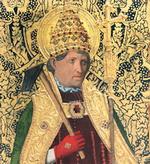Catholic Dictionary
Find accurate definitions of over 5,000 Catholic terms and phrases (including abbreviations). Based on Fr. John Hardon's Modern Catholic Dictionary, © Eternal Life. Used with permission.
Random Term from the Dictionary:
PRIMACY
First in rank. Applied to the Pope as Bishop of Rome, it is a primacy of jurisdiction, which means the possession of full and supreme teaching, legislative and sacerdotal powers in the Catholic Church. St. Peter was promised the primacy when Christ told him that he was to be the rock on which the Savior would build his Church (Matthew 16:18). Peter received the primacy when the risen Christ told him to "feed my lambs, feed my sheep" (John 21:15-17). It follows from the dogma of the primacy that Paul, like the other Apostles, was subordinate to Peter as the supreme head of the whole Church. Pope Innocent X in 1647 rejected Jansenist teaching that Peter and Paul were joint heads of the Church (Denzinger, 1999). According to Christ's ordinance, Peter was to have successors in his primacy over the whole Church and for all time. As defined by the First Vatican Council (1869-70), it is heretical to deny that "in virtue of the decree of Our Lord Jesus Christ Himself, blessed Peter has perpetual successors in his primacy over the universal Church" (Denzinger, 3058). Following the precedent of the Second Council of Lyons (1274) and the Council of Florence (1430), the First Vatican Council further defined that the successors of Peter in the primacy are the Bishops of Rome (Denzinger, 3058). This doctrine affirms that the Bishop of Rome at any time is, in fact, the holder of the primacy. On what legal title the association of the Roman Pontiff's office with the primacy rests is not defined. The more common position is that it rests, not on the historical fact that Peter worked and died as Bishop or Rome, but on a positive ordinance of Christ or of the Holy Spirit, who revealed that the bishops of Rome should be the successors or Peter. Accordingly the fact that the bishops of Rome hold primacy over the universal Church is of divine and not merely human origin.
Like other doctrines of faith, the primacy has under gone considerable development over the centuries. Most recently, the role of the bishops to the Pope was clarified in the teaching of the Second Vatican Council on collegiality. Notwithstanding this development, the basic elements of the primacy have not changed. They are, in brief, that the Pope possesses full and supreme power of jurisdiction over the whole Church and each member in the Church, not only in matters of faith and morals, but in Church discipline and in the government of the Church. (Etym. Latin primus, first, foremost, primary.)






